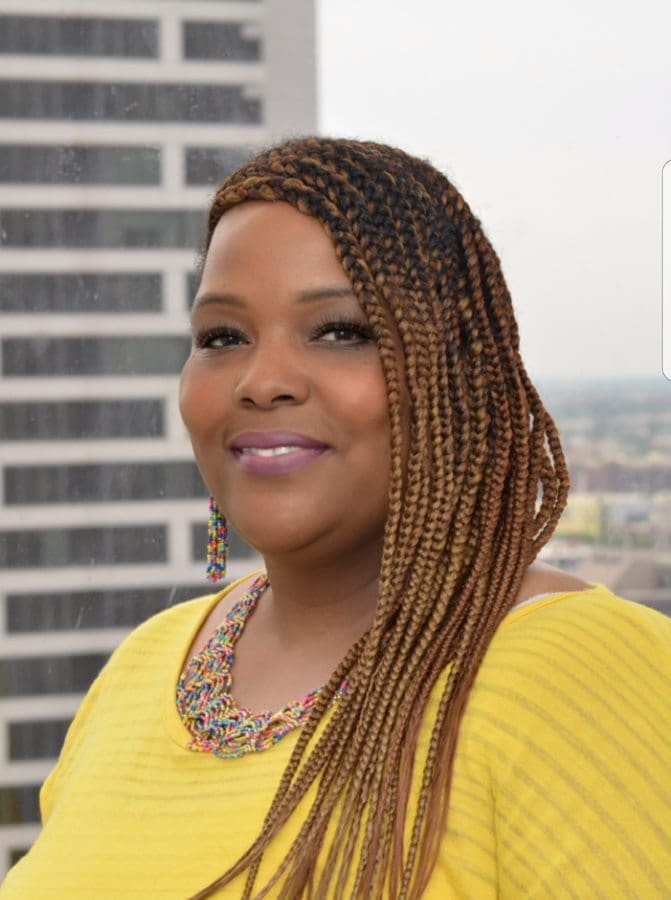 By Raven Feagins
By Raven Feagins
“Imagine putting on multiple hats with each call you receive. Sometimes I’m the person that clients call to laugh and joke with, but oftentimes I’m the person they’re reaching out to because they’re in a crisis. Often, my team and I are the sole individuals that a caller has disclosed their HIV status to at the time of their call. Imagine what it must be like to answer the phone and it’s your loved one, friend, neighbor, etc. Yet, I place my feelings on the back burner and go on with the call because after all, this is my job.
Every day, I keep the fact that so many rely on my team and I in the forefront of my mind when I answer the phone. I can only begin to imagine what it must feel like to share such personal information to a faceless voice over the phone. Sometimes, the perception is I have ‘no clue’ what they must be experiencing. Some days I wish I could just meet the caller and share with them why this work is important to me.”
— Angela Jordan
Angela Jordan describes her team as “the gatekeepers of case management.” She works as the Intake and Referral Manager at the AIDS Foundation of Chicago (AFC), where she and her team take over 700 calls a year from people looking to connect to HIV-related services. A majority of the time, they refer potential clients to case managers who can help them obtain financial assistance, resources for obtaining medications, food assistance and more. Angela has served at AFC for almost 11 years and is passionate about her work due to her own personal connection to the HIV community.
“While it is my job, there’s a meaning behind it for me,” says Angela. “Every time I think about it, I want to tear up … My own personal experience with HIV and AIDS in my high school years was with a friend who was diagnosed … I just saw how she had to hide it. I saw how her family treated her differently and how the disease took her away really really quickly.”
Angela’s friend was diagnosed with HIV at the end of their first year of high school. However, by the end of their senior year, she passed away from AIDS-related complications. Angela remembers vividly how alienated her friend was during that time and often wonders how those years could have been different if Angela herself had more knowledge about HIV to combat the stigma her friend faced every day.
“I just really don’t want anyone to have to go through that by themselves because my friend went through this … not really by herself, but not with the support that she should have had from family and from friends,” says Angela.
The loss of her close friend motivated Angela to enter the world of social services later in life; she wanted to do her part to provide support to people experiencing trying times. Angela has since worked with a range of different communities, including people with mental health disorders, the sex working community and the elderly. However, her current role linking people living with HIV to services that can help them live long, healthy lives allows her to feel even more connected to her high school friend.
Connecting with Angela and her team is more than just a call. They are invested in ensuring that every caller feels cared for and is linked to the appropriate resources, such as housing case management or employment services that will help them receive the best care.
“We do care and we want to make sure that you are happy with the referral placement. It’s not just that we want you to get assigned to anyone, we want to make sure that it’s a good fit,” says Angela. “Sometimes I feel like people think that we’re just doing a job [but] really we think about these people when we hang up the phone – it affects us as well.”
“We do care and we want to make sure that you are happy with the referral placement. It’s not just that we want you to get assigned to anyone, we want to make sure that it’s a good fit,” says Angela. “Sometimes I feel like people think that we’re just doing a job [but] really we think about these people when we hang up the phone – it affects us as well.”
Angela and her team members are often so moved by the stories they hear from callers that they are brought to tears. It affects them even more knowing that they have no additional contact with clients after they are referred to services, so they are mostly left to wonder. However, sometimes clients take it upon themselves to call Angela and her team back to thank them for linking them to the resources they needed.
“The most rewarding part about my job is when someone calls, you link them to case management and they call you back and tell you that they love their case manager and that their immediate need(s) have been met,” says Angela. “That makes me think that what we’re doing is all worth it.”
If you or someone you know is looking to connect with a case manager or get other HIV-related services, give Angela and her team a call at 312-690-8860.

